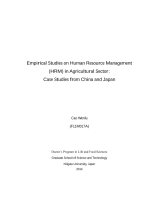Empirical Studies on Human Resource Management (HRM) in Agricultural Sector : Case Studies from China and Japan Empirical Studies on Human Resource Management (HRM) in Agricultural Sector : Case Studies from China and Japan 農業における人的資源管理に関する実証的研究 : 中国と日本を事例として
Access this Article
Author
Bibliographic Information
- Title
-
Empirical Studies on Human Resource Management (HRM) in Agricultural Sector : Case Studies from China and Japan
- Other Title
-
Empirical Studies on Human Resource Management (HRM) in Agricultural Sector : Case Studies from China and Japan
- Other Title
-
農業における人的資源管理に関する実証的研究 : 中国と日本を事例として
- Author
-
Cao, Wenlu
- University
-
新潟大学
- Types of degree
-
博士(学術)
- Grant ID
-
甲第3907号
- Degree year
-
2014-03-24
Note and Description
Human resources are essential for the sustainability and competitiveness of agricultural development not only in developing countries but also in developed countries. Especially, with the advent of increasing scale of farm households and agricultural corporations, attention to the management of human resources (HRM) should be paid for realizing the objectives of human development. The purpose of this paper is to empirically analyze the situations and the characteristics of HRM in the agricultural sector in China and Japan. First, current situations of human resources in agricultural sector both in China and Japan were described according to the data from government statistics and censuses, and literature review on HRM in agricultural sector was undertaken for understanding the background of the issue. Secondly, for the empirical analysis on HRM in agricultural sector in China, case study from state-owned farms in Heilongjiang province was undertaken to clarify the actual conditions and characteristics of HRM in these farms through person to person and telephone interview as well as questionnaire survey. Additionally, Data Envelopment Analysis (DEA) was introduced for measuring the technical efficiency of state-owned farms in Heilongjiang province and that of targeted farms. Thirdly, empirical analysis on the HRM in agricultural sector in Japan was undertaken focusing on the employee attitude and using the Structural Equation Modeling (SEM) to clarify the causal relationship among multiple dependent variables as well as factors. Finally, policy implications on the HRM in agricultural sector both in China and Japan were drawn based on the analytical results. Following analytical results are obtained. Results from case study in China showed that, first, by introducing new strategy so called "Baiqianwan Talents Project", they started to pay more attention to the importance of human resources and cultivating managers. Second, questionnaire on employees of farms manifests the importance of material HRM and the promotion opportunity as well as learning opportunity. Third, they started to search their own corporate cultures such as "learn by doing", "harmonization" and "development".
Results from case study in Japan showed that, first, communication between managers and employees and appropriate HRM policies and practices may affect employees’ attitude was clarified. Second, both professional training and education before and after employment can be an important career path for the employee in agricultural corporations. Third, providing agricultural experience to young people at an early stage not only influences them to choose agriculture as a profession but also provides them with greater satisfaction with their job. Based on the above empirical results, we can draw policy implications as follows. For the case of China, it is assumed that they are trying to change their goal of development from the stage of emphasizing on physical capital to the stage of emphasizing on human capital. However, in the processes of agricultural development, more attentions should be paid to the accumulation of knowledge capital as well as social capital for creating innovation and increasing competitiveness under the progress of globalization. On the other hand, although Japanese economy has passed its initial stage of development for the decades, the agricultural sector in Japan is still facing the problems of accumulation of human capital, knowledge capital as well as social capital. For realizing a sustainable and competitive agricultural sector, it is important for Japanese government to encourage young farmers to have entrepreneurship and give more opportunities to agricultural corporations to be innovative and competitive. However this paper focused on the state-owned farms in China and agricultural corporations in Japan, HRM in other kinds of organization both in the two countries might be better to be included into the investigation. Furthermore, a research reflecting the change of HRM in these organizations might also be better to be undertaken in the paper. These will be our next research agenda.
学位の種類: 博士(学術). 報告番号: 甲第3907号. 学位記番号: 新大院博(学)甲第204号. 学位授与年月日: 平成26年3月24日
新大院博(学)甲第204号
開始ページ : 1
終了ページ : 134
